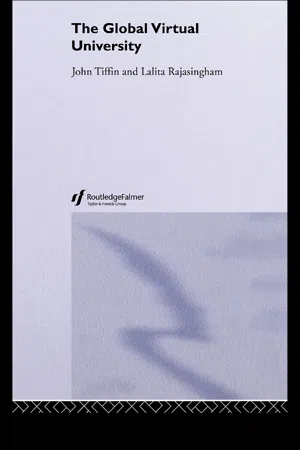
- 188 pages
- English
- ePUB (mobile friendly)
- Available on iOS & Android
eBook - ePub
The Global Virtual University
About this book
This book is about the shift from the modern university of the nation state to the global virtual university of the future. John Tiffin and Lalita Rajasingham launched the idea of virtual universities on the Internet with the publication of 'In Search of the Virtual Class: Education in an Information Society' in 1995. Since then, virtual universities have multiplied worldwide. However, the authors argue that globalisation and the Internet are still in their infancy, and universities have yet to face the challenges of global free trade in broadband telecommunications, artificial intelligence and HyperReality.
Based on material gathered from research in the USA, Japan, Taiwan, Brazil, Malaysia, Australia and New Zealand, this book describes how a global university could function in the future and presents a paradigm from which it might be constructed.
This unique, visionary text will be critical reading for academics, postgraduate students and for anyone involve din policymaking and planning within the university community and administration.
Tools to learn more effectively

Saving Books

Keyword Search

Annotating Text

Listen to it instead
Information
Chapter 1
The universals of a university
The purpose of a university is to address the great issues of its time.
(Wang 1999: verbal personal communication)
…the university was no longer a place of learning, but a commercial enterprise, a degree shop run by soulless administrators who cut costs ruthlessly and over-worked the shrinking numbers of their academic staff.
(Hewett 1999:155)
…a bureaucratic institution for sifting, sorting and credentialing the otherwise undifferentiated masses.
(Miller 1998:22)
A Northern Territory University Professor has been threatened with decapitation if students fail an English language exam this week.
(The Australian 2002)
…the knowledge factory, as it were, at the centre of the knowledge economy.
(The Economist 1997)
Introduction
The Chancellor of the University was required to give his final address stark naked then to lie on his belly while his head was chopped off. His body was then placed in an open grave without shroud or coffin and his head was stuck on a pole for a fortnight, after which it was thrown in the river to make room for the head of the University’s High Steward (Richards 1995).
This is not an undergraduate fantasy. The university was Cambridge, the year was 1535, the Chancellor was John Fisher and the High Steward was Sir Thomas More. Their problem was that they held to the monolithic authority of the pope to reveal God’s meaning for the world and decide such issues as whether a king could divorce a queen. Papal authority was the keystone in the structure of logic that universities taught and the mindset that held the medieval world together. But the Reformation had begun. Papal infallibility was under question. North of the European Alps powerful renaissance princes like Henry VIII were asserting the sovereignty of the state. In the edifice of the medieval university were appearing the first cracks that would ultimately open the way for the modern university. University academics that failed to adjust what they taught and researched accordingly suffered similar fates to More and Fisher.
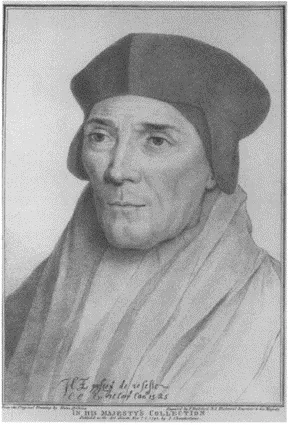
Figure 1.1 John Fisher Chancellor of Cambridge University (1514–35). (Permission of the Master and Fellows of St John’s College, Cambridge.) Heading up a university has been a risky occupation since the days of Socrates
Since the 1960s it seems as though all the world could see that once again ‘the times they are a-changing’, except for those who managed the modern university. They continued to operate as though by some divine right, while the world they were supposed to prepare people for changed about them. Not anymore. Once again the heads of chancellors and vice-chancellors roll, albeit virtually. Is this ‘the end of university?’ as Majid Tehranian (1996) asks.
Universities are still focused on the receding national issues of the countries they serve at a time when globalisation is becoming the burning issue, not globalisation in the sense of a neoliberal economic environment for free trade, but in the fuller sense that Marshall McLuhan envisaged when he wrote of a global village (McLuhan and Fiore 1967). We are all inextricably interconnected in a global information environment that brings global awareness and with it global responsibility for sustainable development, for seeking solutions for pollution, poverty, pandemics and climatic change, and for learning to live together. No country, not even the USA, can think of itself anymore as ‘an island, entire of itself’. The challenge is to develop a university that rises above partisanship to cultivate cadres of professionals who deal with global issues.
This book is about the idea of a global virtual university. Who should teach what to whom and how in the future? Who will academics serve when universities are global, how will they be paid and by whom, how will they and their students be assessed? What rules, procedures and philosophies will hold them together? To address these questions we consider the university as a paradigm.
The university paradigm
If one were to name a single text as a starting point for thinking about the idea of a university as a paradigm it would have to be Thomas Kuhn’s The Structure of Scientific Revolutions (Kuhn 1962). By casting doubt on the objectivity of the scientific method, it brought into question the philosophical grounds on which the modern university stands.
Kuhn used paradigm to mean ‘what the members of a scientific community, and they alone, share’ (Kuhn 1977:294) and explained that such
communities are characterised by the relative fullness of communication within the group and by the relative unanimity of the group’s judgement in professional matters. To a remarkable extent the members of a given community will have absorbed the same literature and drawn similar lessons from it.
(Ibid.: 296)
The history of science according to Kuhn is not a logical progression toward revealing the nature of the world we live in. Rather, science develops in stages of well defined norm paradigms separated by scientific revolutions. In a norm paradigm research results complement each other. New knowledge fills in missing pieces in the jigsaw puzzle of the norm paradigm. Practitioners are trained to solve problems according to the norm paradigm and have a vested interest in its preservation. When research findings do not fit the norm paradigm, a paradox is created. If the research and the researcher are discredited, the norm paradigm is reinforced, but if the problem proves to lie with the paradigm, the resulting scientific revolution involves competition between new paradigms until a new norm paradigm emerges to resolve the paradox. Science seen like this is more a self-maintaining cultural communication system than an objective search for truth.
Kuhn’s concept of paradigms has been widely applied in other fields. Heinich (1970) talks of educational paradigms and Carlotta Perez (1983) of technological paradigms. The way Kuhn applies the concept of a paradigm to science can be applied to any university discipline. Indeed it fits any socially established system of knowledge.
A hundred years after Fisher and More of Cambridge were executed for upholding the primacy of the papacy in resolving any paradoxes that might present themselves to a university, Galileo Galilei of the University of Padua was accused of heresy by the Inquisition for arguing the heliocentric case that the earth orbited the sun. Galileo, however, was on the southern side of the Alps where the counter-Reformation was in full swing and the pope still ruled on paradoxical issues according to the norm paradigm as defined by the Bible. Galileo was only saved from torture and execution by recanting. Yes, the earth was the centre of the universe, as of course it had to be because God located the Garden of Eden there.
Dava Sobel (1999) links the life of Galileo with that of his daughter who was a nun in a closed order. Their correspondence shows how the philosopher and the seminarist were both locked into a world where everything was explained and justified in terms of God’s intention as interpreted by the Roman Catholic Church. The dominance of such a mindset can only be understood by comparing it to the scientific rationalism in which the developed world and its universities are immersed today. Michel Foucault calls such zeitgeist an episteme by which he means an all-encompassing body of unconscious knowledge peculiar to a particular time and place.
There is similarity between Foucault’s idea of an episteme and Kuhn’s concept of a paradigm (Major-Poetzl 1983:86). Kuhn’s idea that ‘when paradigms change, the world itself changes with them’ (1962:110) reflects Foucault’s view of an episteme as a worldview that is so comprehensive it is not possible for people in one episteme to comprehend the way people in another episteme think (Foucault 1970). We could think of an episteme as a metaparadigm of all the paradigms by which people live as they eat, dress, work, fight, play, talk (and go to university). The difference between an episteme and other paradigms, such as those of the university, science and clothes, is in its comprehensiveness. We can walk away from a game of tennis or a lecture on political science and recognise that other people play different games and take different subjects, but we cannot as readily exit from the episteme we live in or comprehend epistemes we do not live in. We are conscious of our use of the paradigms within an episteme. We seek to acquire knowledge of paradigms so that we ‘know’ how to do things in ways of which our society approves. We go to university to learn advanced complex paradigms and to critique them so that we can improve them, but we do not lightly shift paradigms. To do so is to invite discord in the harmony of the intermeshed paradigms that make an episteme.
Galileo looked outside his episteme when he saw the mountains of the moon through his new telescope and worked out that Venus orbited the sun and that the heavens were not immutable. Galileo wrote about his discoveries from scientific and mathematical, not biblical, premises and in Italian not Latin, so that the reader could follow the reasoning instead of having to accept it. The issue with Fisher was who should decide what God intended marriage to be. The issue at the centre of Galileo’s trial was the source of knowledge: who explained the world, God or humans? This was the key philosophical issue that would ultimately distinguish the medieval from the modern episteme and consequently, the medieval from the modern university.
In the medieval university knowledge was based on God’s will as it was revealed in the Latin version of the Bible. In the modern university, knowledge is based on the texts of authoritative, widely-referenced authors who rationalise along accepted logical grounds and intertextualise with a community of peers to develop agreed bodies of knowledge preferably in the language of the state that supports the university. These constitute the national norm paradigms of the subjects that, in sum, make up the curriculum of a national education system. Students sit exams that test their comprehension of what the textbook writers intended them to understand. Then they go forth to teach, manage and practise in the professional community for which their study of the knowledge paradigm has prepared them, bringing scientific rationalism to bear on the problems of industrial societies. They are the priesthood of modernism, the texts they study are its bibles, the authors its gods.
The modern university that emerged from the Enlightenment to serve the needs of the nation state through the application of scientific rationalism is still with us. It is still the legitimate university, but signs that all was not well with it came in 1968 when students and academics in Paris staged a revolt against the authoritarianism of the modern university and its failure to address the issues of the time. This was the year that Philip Coombs (1968) reflected global concern that education was preparing people for the past instead of the future. Les évènements in Paris rumbled on around the universities of the world and down through the years that followed, manifesting itself in a variety of guises as feminism, cultural theory, postmodernism and now as a form of globalisation ironically called anti-globalisation.
In 1977 Roland Barthes announced the ‘death of the author’ (Barthes 1977). By this he meant that once a text is published it is the reader who gives it meaning. Readers become the new gods creating their own individual virtual worlds from the bits of information provided by a text. Many will remember the way in the past some academics behaved as though they were minor deities. Anyone who is teaching today in a university will encounter students who expect to be treated as something very special. Jacques Derrida taught the intelligentsia to deconstruct the meaning in texts and to find that there was no single universal meaning (Derrida 1974). Jean-François Lyotard defined the postmodern condition as ‘incredulity towards meta-narratives’ in which he included both religion and science (Lyotard 1984: xxiv). Critical theory in its many forms has attacked the theoretical structures that have held together the modern university and modern society. The effect has been to erode the episteme of modernism that universities have maintained and the consequent worldviews by which we cooperate in what we see as civilisation. When we are all gods, who is left to believe in us?
Kuhn’s concept of a paradigm can be applied to the idea of a university itself. Could we then see a paradigm shift in the way the medieval university became the modern university and argue that we are undergoing another shift from the modern to the global virtual university? The scientific revolutions that Kuhn regarded as paradigm shifts really were revolutions. It is not possible to reconcile genesis with geology. Equally the industrial revolution really was a revolution. Life in pre-industrial societies was radically different from that in industrial societies. The change between the medieval and modern universities was not of this order. It was more in the nature of an adaptation to the episteme shift of the industrial revolution.
Paradigms on paradigms
If you found yourself transported to a thirteenth-century university somewhere in Europe you might not understand the Latin people were using and people might stare if you were a woman or not properly gowned, but you would have little difficulty in recognising that you were in a university. From the founding of Bologna University in 1088 there has been strong institutional continuity in universities. They have continued to hold lectures, seminars and tutorials that cover a fixed curriculum. They still have faculties, deans, rectors, chancellors and vice-chancellors, and students have been writing assignments, arguing, getting drunk and taking Bachelors and Masters degrees for almost a thousand years. These are components of the university paradigm that everyone recognises. Most medieval universities survived and transformed themselves into modern universities and new universities still follow the traditions of the medieval universities. The philosophical paradigm of what was taught and researched shifted from theology to rational scientism as the university adapted to the epistemic shift from the medieval to the modern, but the institutional form of the university stayed relatively constant. What was taught changed, but how it was taught has remained the same. We could, therefore, think of a paradigm of the medieval-modern university that has lasted with little change over 900 years.
A question that faces us in designing a global virtual university for the future is whether it will continue within the norm paradigm of the university as an institution. Can the university paradigm adapt to the epistemic shift of the information revolution and the philosophical shift of the postmodern? Will we continue offering degrees, using traditional titles, completing terms and holding medieval rituals where the participants dress in the mock medieval finery of monks to graduate students, or will there be the kind of disjuncture that took place between the Greek idea of a university and the medieval institution of a university?
If you were now transported to a class in ancient Greece would you recognise it as a university? Many American universities echo ancient Greece in their architecture so that the classic surroundings would suggest a university, but we have no evidence that there was any kind of classroom or formal sequence of lectures or that degrees were awarded. You might be startled by the scant attire of the students, but they would be intelligent, schooled and adult and women were part of the Greek university tradition
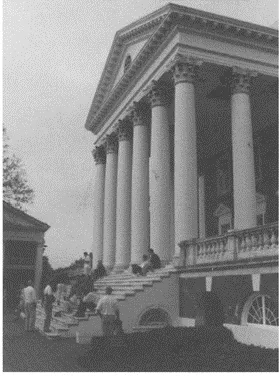
Figure 1.2a The University of Virginia founded in 1819 is an expression of Thomas Jefferson’s belief that a new university for a new country should be based on the example of ancient Greece
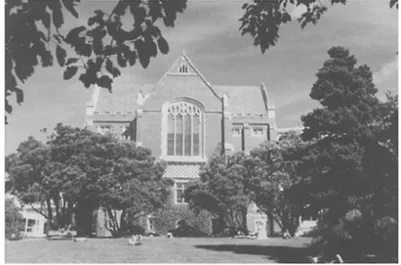
Figure 1.2b Victoria University of Wellington, only 100 years old, looks back to the influence of the medieval church
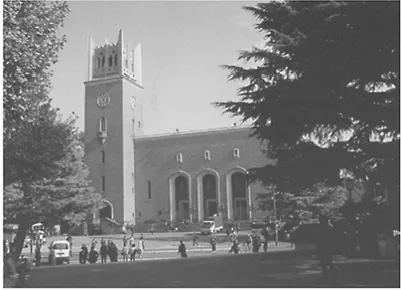
Fig...
Table of contents
- Cover Page
- Title Page
- Copyright Page
- Illustrations
- Foreword
- Preface
- Acknowledgements
- Chapter 1: The Universals of a University
- Chapter 2: Universities Have IT
- Chapter 3: Instruction In Universities
- Chapter 4: New Academics for Old
- Chapter 5: Old Students for New
- Chapter 6: Play the Game: Knowledge In Universities
- Chapter 7: The Problem’s the Thing: Research In a Global Virtual University
- Chapter 8: The Curriculum of Globalisation
- Chapter 9: Global Corporate
- Bibliography
Frequently asked questions
Yes, you can cancel anytime from the Subscription tab in your account settings on the Perlego website. Your subscription will stay active until the end of your current billing period. Learn how to cancel your subscription
No, books cannot be downloaded as external files, such as PDFs, for use outside of Perlego. However, you can download books within the Perlego app for offline reading on mobile or tablet. Learn how to download books offline
Perlego offers two plans: Essential and Complete
- Essential is ideal for learners and professionals who enjoy exploring a wide range of subjects. Access the Essential Library with 800,000+ trusted titles and best-sellers across business, personal growth, and the humanities. Includes unlimited reading time and Standard Read Aloud voice.
- Complete: Perfect for advanced learners and researchers needing full, unrestricted access. Unlock 1.4M+ books across hundreds of subjects, including academic and specialized titles. The Complete Plan also includes advanced features like Premium Read Aloud and Research Assistant.
We are an online textbook subscription service, where you can get access to an entire online library for less than the price of a single book per month. With over 1 million books across 990+ topics, we’ve got you covered! Learn about our mission
Look out for the read-aloud symbol on your next book to see if you can listen to it. The read-aloud tool reads text aloud for you, highlighting the text as it is being read. You can pause it, speed it up and slow it down. Learn more about Read Aloud
Yes! You can use the Perlego app on both iOS and Android devices to read anytime, anywhere — even offline. Perfect for commutes or when you’re on the go.
Please note we cannot support devices running on iOS 13 and Android 7 or earlier. Learn more about using the app
Please note we cannot support devices running on iOS 13 and Android 7 or earlier. Learn more about using the app
Yes, you can access The Global Virtual University by Lalita Rajasingham,John Tiffin in PDF and/or ePUB format, as well as other popular books in Education & Education General. We have over one million books available in our catalogue for you to explore.